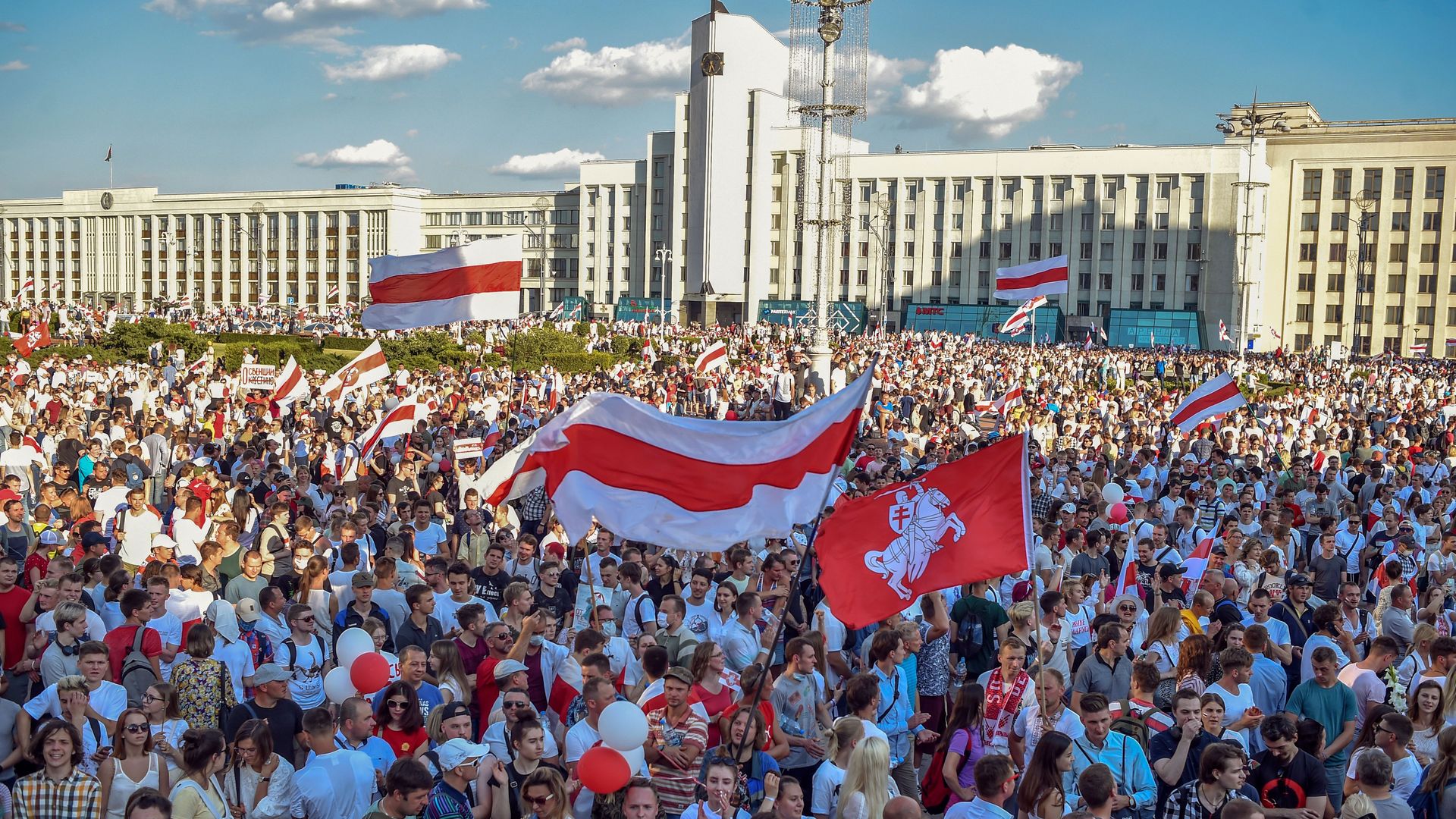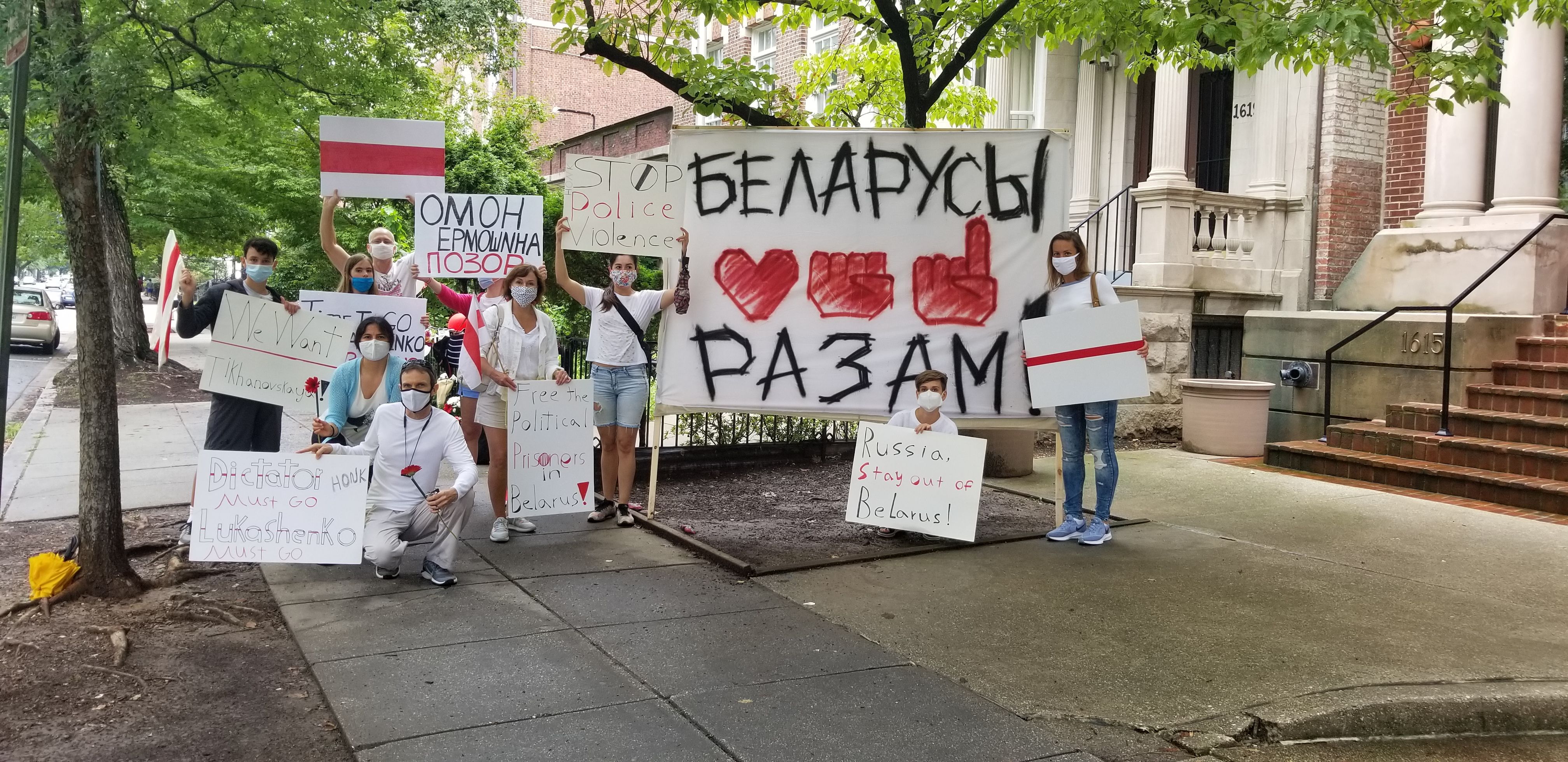Belarus protests: Shaken strongman Lukashenko turns to Putin
Add Axios as your preferred source to
see more of our stories on Google.

Out in force in Minsk. Photo: Sergei Gapon/AFP via Getty Images
The man who has ruled Belarus for 26 years growled today that protesters demanding new elections would have to kill him first, while his would-be successor announced she was prepared to take charge.
Why it matters: Aleksandr Lukashenko has never before appeared so weak — but he still has a fearsome security apparatus behind him, and a global power watching from the east.
Driving the news: Streets across the country were flooded with protesters over the weekend, while workers at Belarus’ state-owned enterprises and state TV network — two pillars of Lukashenko’s support — have now joined strikes.
- “Come, sit down, we’ll work on the constitution,” Lukashenko told factory workers today. “Yes, I'm no saint. You know I can be tough, but you know that if there was no toughness, there wouldn’t be a country.”
- When they drowned him out, shouting for new elections, he turned icy: “We held elections. Until you kill me, there will be no other elections.”
- Meanwhile opposition candidate Svetlana Tikhanovskaya, who fled to Lithuania after the vote, released a YouTube video saying she now was prepared to step in, release all detained protesters, and hold “real, honest, and transparent elections.”
What to watch: Lukashenko has utterly failed to reassert control in the eight days since he claimed a preposterous 80% of the presidential vote. What happens next may thus depend on another strongman: Russia’s Vladimir Putin.
- Lukashenko has appealed for Putin’s help, though their relationship had recently grown frosty as he resisted Putin’s push for a Russia-Belarus political union and arrested Russian mercenaries in a bizarre pre-election incident.
Between the lines: “The Kremlin is not wedded to Lukashenko: it has had enough of him,” writes Carnegie Moscow’s Dmitri Trenin.
- “It cannot, however, allow Belarus to follow the path of Ukraine and become another anti-Russian, NATO-leaning bulwark on its borders.”
- With Lukashenko’s legitimacy now “gone forever,” Trenin contends, Russia’s best option is to convince him to step aside and “manage a transfer of power” that secures its interests.
What to watch: “At present, this is a wholly anti-Lukashenko movement, with no anti-Russian dimension, nor even an explicitly pro-Western one,” notes Russia analyst Mark Galeotti.
- Direct Russian action, particularly on behalf of Lukashenko, could change that.
- What Putin needs most are loyalty and stability from a country that sits on Russia's border and in its sphere of influence. His priority may thus be to secure his influence in a post-Lukashenko Belarus.
What to watch: “My pessimistic point of view is that Russia will get involved," Lena Smirnova, a Belarusian who relocated to Baltimore in 2012, told Axios. "That Lukashenko will go, but it won’t be beneficial for Belarus. This is the worst-case scenario.”
Smirnova was part of a small but enthusiastic group of protesters gathered outside the Belarusian Embassy in Washington on Sunday.

- She expressed confidence that Lukashenko's days were numbered but concern about what would come next.
- “We hope that he will go but we will maintain independence," she said. "That someone else will come and we will have democratic elections without Lukashenko, and we will move forward with the Western world."
- Smirnova said her fellow Belarusians should be aware that “when he goes, it will be hard. It will be worse probably, in the short term, because the economy will struggle for a while until it rebuilds again."
Alesya Semukha-Greenberg, a fellow Minsk native who has lived in the U.S. since 1995, said the peace and economic stability of the Lukashenko years had once satisfied Belarusians, "but a time of peace in prison has its limits.”
- “I have a lot of friends and relatives in Minsk, and I’ve been asking them, ‘why now?’" she said.
- First, she was told, came Lukashenko's indifference and ineffectiveness in the face of the pandemic. Then came the "disrespectful and unbearable" election charade. "People felt their dignity was totally ignored," she said.
- “The brutality of the police just brought more people on the street," Semukha-Greenberg continued. "It was just like a gang on the streets of Minsk.”
- She hopes the European Union will pressure Lukashenko to "end the bloodshed" and step aside, allowing Belarus to "go through the struggle of building the democracy."
The bottom line: "It’s not going to be easy, but it's the only way," she said. "26 years of this prison is long enough.”
